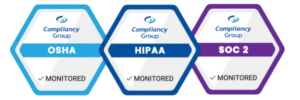What is Oregon HIPAA: Oregon HIPAA Laws
Oregon HIPAA Laws
Oregon HIPAA laws consist of both the federal HIPAA law and Oregon state privacy law. Healthcare entities that create, receive, maintain, or transmit the information of Oregon residents must comply with HIPAA as well as the Oregon state privacy law.
Complying with HIPAA
To meet the requirements of the HIPAA regulations, healthcare organizations (healthcare providers, healthcare vendors, and MSPs) must implement a HIPAA compliance program.
Security Risk Assessments, Gap Identification, and Remediation
To be HIPAA compliant, it is crucial to identify where your deficiencies lie. To do so, healthcare organizations must conduct six self-audits annually. These self-audits uncover weaknesses and vulnerabilities in your security practices. To ensure that your organization meets HIPAA safeguard requirements, you must create remediation plans. Remediation plans list your identified deficiencies and how you plan to address them, including actions and a timeline.
HIPAA Policies and Procedures
To ensure that you meet HIPAA Privacy, Security, and Breach Notification requirements, you must implement written policies and procedures. These policies and procedures must be customized for your practice’s specific needs, applying directly to how your business operates. To account for any changes in your business practices, you must review your policies and procedures annually and make amendments where appropriate.
Employee HIPAA Training
To make sure that your employees are aware of their responsibilities regarding the HIPAA rules, they must be trained annually. This training must cover HIPAA basics, an overview of your organization’s policies and procedures, and cybersecurity best practices.
Business Associate Agreements
Business associate agreements must be signed with each of your business associate vendors. HIPAA defines a business associate as any entity that performs a service for your practice that gives them the potential to access PHI. Common examples of business associates include electronic health records platforms, email service providers, online appointment scheduling software, and cloud storage providers.
You cannot use any vendor and be HIPAA compliant. They need to be willing and able to sign a business associate agreement (BAA). A BAA is a legal contract that requires each signing party to be HIPAA compliant and be responsible for maintaining their compliance. When a vendor doesn’t sign a BAA, it cannot be used for business associate services.
Incident Management
To comply with the HIPAA Breach Notification Rule, you must have a system to detect, respond to, and report breaches. Employees must also have the means to report incidents anonymously and be aware of what to do if they suspect an incident has occurred.
HIPAA Notice of Privacy Practices in Oregon
Under HIPAA regulations, covered entities are required to provide individuals with a Notice of Privacy Practices in plain language that contains:
- The following statement, as a header, or otherwise prominently displayed: “THIS NOTICE DESCRIBES HOW MEDICAL INFORMATION ABOUT YOU MAY BE USED AND DISCLOSED AND HOW YOU CAN GET ACCESS TO THIS INFORMATION. PLEASE REVIEW IT CAREFULLY.”
- A description of how PHI can be used for treatment, payment, and health care operations.
- A description of the types of PHI uses and disclosures requiring patient authorization.
- A description of the circumstances in which the covered entity may use or disclose PHI without written authorization.
- A covered entity may use or disclose PHI without authorization for a number of purposes. Examples include public health and health oversight activities, and judicial proceedings.
- The name, title, and phone number of a person or office to contact for further information or questions about the notice.
- The date on which the notice is first in effect.
- A statement that an individual may revoke an authorization.
HIPAA Training Oregon
HIPAA imposes employee training requirements that are the same regardless of the state the healthcare organization operates in. HIPAA training in Oregon must be provided to each employee that has the potential to access PHI. Training must be provided annually, in which employees must legally attest that they understand and agree to adhere to the training material.
HIPAA Release Form Oregon
Under the Oregon Policy for Protected Health Information, patient medical records may not be disclosed without authorization unless disclosure is required for litigation or is required to communicate important medical information to other healthcare providers, insurers, and other interested parties.
Oregon law imposes very specific requirements (more stringent than those under HIPAA) for authorizations to be valid.
Under Oregon law, a medical release form allowing disclosure by a provider of healthcare must contain the following information(among other requirements):
- State the specific uses and limitations on the types of medical information
- State the name or functions of the healthcare provider
- State a specific date after which the provider is no longer authorized to disclose the medical information
- Require specific authorization for release of records related to:
- HIV/AIDS Information
- Mental Health Information
- Genetic Testing Information
- Drug/alcohol diagnosis, treatment, or referral information
- Be clearly separate from any other language present on the same page
- Be executed by a signature that serves no other purpose than to execute the authorization
- Be signed and dated by the patient. A patient who is a minor may only sign an authorization for the release of treatment information records if the medical services given to the minor were services the minor could have lawfully consented to in the first place
- If the patient is incapacitated, a legal representative may sign and date the authorization
- A spouse of the patient, or the person financially responsible for the patient, may sign and date the authorization.
- In cases where the patient is deceased, the patient’s personal representative may sign and date the Oregon medical release form
Oregon HIPAA Breach Notification Requirements
The HIPAA Breach Notification Rule requires healthcare organizations to report breaches that compromise the confidentiality, integrity, or availability of protected health information.
Incidents that are considered reportable breaches include:
- Hacking or IT incidents
- Unauthorized access or disclosure of PHI
- Theft or loss of an unencrypted device with access to PHI
- Improper disposal of medical records
When a patient’s PHI is potentially affected by one of these incidents, the affected patient must be informed within 60 days of discovery. Breach notification letters must be mailed to affected patients. If ten or more patients cannot be reached by mail, a substitute notice must be available on the organization’s website. If the incident affected 500 or more patients, the breached organization must notify media outlets to ensure that all affected patients are aware of the incident.
Breach notification requirements to the Department of Health and Human Services (HHS) differ depending on how many patients are affected by the incident.
- Breaches affecting 1 – 499 patients: organizations must keep an account of any breach that involved less than 500 patients over the course of the calendar year. Organizations have 60 days from the end of the calendar year in which the breach occurred to report these incidents to the HHS – March 1st.
- Breaches affecting 500+ patients: any incident that affected 500 or more patients must be reported to the HHS within 60 days of discovering the incident. These incidents are posted on the OCR’s online breach portal.
Oregon adds one additional requirement to the standard HIPAA breach notification requirements. Any breach affecting more than 250 Oregon residents must also be reported to the state Attorney General.
So in summation, Oregon HIPAA breach notification requirements dictate that PHI breaches be reported to the Department of Health and Human Services under HIPAA guidelines, and to patients and the Oregon Attorney General under Oregon’s guidelines.
HIPAA Violation Oregon
HIPAA violations in Oregon occur when healthcare organizations fail to comply with the standards set forth by HIPAA. While many HIPAA violations occur as the result of breaches, it is not the breach itself that would conclude that a healthcare organization violated HIPAA. Most HIPAA violations occur when healthcare organizations fail to conduct accurate and thorough risk assessments, provide patients timely access to their medical records, have signed business associate agreements, or report breaches promptly.
Oregon Fees Charged to Disclose PHI
A health care provider or state health plan that receives authorization to disclose protected health information may charge:
- No more than $30 for copying 10 or fewer pages of written material, no more than 50 cents per page for pages 11 through 50, and no more than 25 cents for each additional page;
- A bonus charge of $5 if the request for records is processed and the records are mailed by First-Class mail to the requester within seven business days after the date of the request;
- Postage costs to mail copies of protected health information or an explanation or summary of protected health information, if requested by an individual or a personal representative of the individual; and
- Actual costs of preparing an explanation or summary of protected health information, if requested by an individual or a personal representative of the individual. [Formerly 192.521].
State medical record fee rules, including Oregon’s, must comport with the HIPAA right of access standard, which requires that medical records fees charged to patients be reasonable and cost-based.






